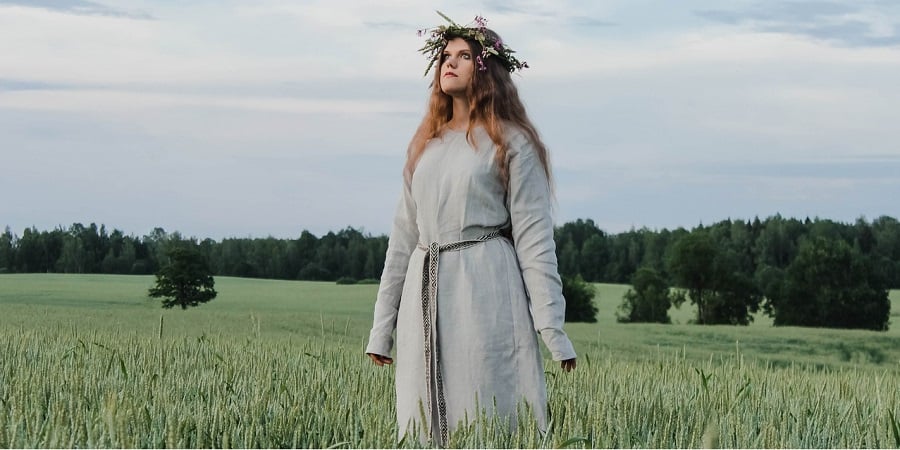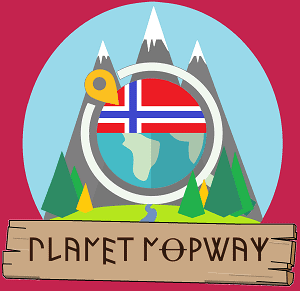One of the most prominent goddesses in Norse mythology is Freyja, who the Vikings considered the god of Love and fertility.
In Norse sagas, she is portrayed as a beautiful maiden who rode her golden bristled boar Hildisvíni or her chariot drawn by two cats. She is also said to rule over Fólkvangr, Her great hall where she would receive half those slain in battle.
Despite her portrayal as a beautiful and powerful goddess, the sagas also reveal a tragic figure missing her often-absent husband Óðr for whom she would weep tears of red gold. Continue reading to learn more about one of the most fascinating goddesses in Norse mythology.

Who was Freyja?
Freyja’s name means “the lady” in Norse. Some scholars believe the goddess Frigg might be her real name as they share so many similarities. However, Frigg and Freyja both appear in some of the myths we have passed down to us, so this idea is contested.
Freyja was born of Njord, the god of the sea, wealth, and crops, which made her one of the Vanir gods. Along with her father, she went to live among the Æsir gods in the aftermath of the Aesir-Vanir War.
Here she became an honorary member of the Aesir Pantheon and was given the responsibility of overseeing the offering of sacrifices to the gods by Odin.
She is also said to have had her own court, Fólkvangr within the great hall with the other gods and goddesses. Here she is said to have received half of the Viking warriors slain in battle, with the other going to Odin’s hall, Valhalla.
She is described as having a cloak of falcon feathers that would fly around her as she rode her golden bristled boar Hildisvíni or her chariot drawn by two cats.
As the goddess of fertility, the other gods often propositioned her. She would sometimes give them her cloak of falcon feathers to give them the power of flight and help with their quests. However, her most treasured item was the amber necklace Brísingamen, which she protects with a fiery passion. It is said to have been made by the dwarves, who have a skill for fine craftsmanship
She is also said to have practiced seidr, a form of Norse magic that foretold the future, and taught other gods and humans how to perform it. For this, some gods accused her of teaching witchcraft.
Family
As mentioned, Freyja was the daughter of Njord, the Norse god of the sea, wealth, and crops. Her brother was Freyr, a god of prosperity, good weather, and male virility. They are known as the twin gods of fertility.
Together they made up the trio of Vanir gods that went to live among the Æsir gods in Asgard as part of the truce after the Aesir-Vanir War.
She is also said to have a Husband called Óðr, whose name is virtually identical to that of Óðinn (the Old Norse form of “Odin”), with whom she has 2 children, Hnoss and Gersemi, whose names both mean “treasure.”.
Óðr appears to be an obscure and seldom-mentioned character in Old Norse literature, however, the sagas mention that he is often away on long journeys and that Freya can often be found weeping tears of red gold over his absence.
Mythology (in the sagas)
Freyja is involved in many stories documented in the old Norse Sagas. In the Ynglinga saga, after the peace settlement of the Aesir-Vanir War, Odin asks Freyja to oversee the offering of sacrifices to the gods.
Accepting this duty, she preserves the peace of the gods and continues the cycle of fertility in humans, allowing the world to continue on in peace. She is also said to have used her soothsaying magic, seidr, to predict Ragnarok, the destruction of all the gods.
There are many times in the sagas when Freyja is generous and helpful. For example, in the Hyndluljód, her faithful servant Ottar wants to know his ancestry. So, transforming him into her boar, Hildisvíni, she takes him to the wise woman Hyndla. After threatening to kill her, Freyja gets Hyndla to recite his genealogy. She then tells her to give Ottar the beer of memory to remember the genealogy even as he leaves.
When Thor loses his hammer
In the Þrymskviða, when Thor loses his hammer Mjöllnir, he and Loki go to Freyja’s court to ask her if they may use her cloak of falcon feathers. Using the cloak to fly to the land of Jötunheimr, Loki finds that Þrymr has buried the hammer deep within the earth and won’t reveal its location unless Freyja agrees to marry him.
Thor and Loki then go back to Freyja and ask her to wear a bride’s outfit and ride with them back to Jötunheimr so that they may trick Þrymr into revealing the location of the hammer. She is furious, saying that she would look like the most lustful woman in the world if she rode with them wearing a wedding veil to Jötunheimr.
Assembling the gods and goddesses, they work out a solution where Thor will dress up as a bride and Loki as his maid. To help with the illusion, Freyja gives Thor her prized amber necklace, Brísingamen, to wear. Thor and Loki succeed in getting back the hammer by force after their disguises are found out.
Freyja’s confrontation with Loki
Finally, in the Lokasenna, Loki accuses Freyja of having slept with all the gods and elves, including her brother Freyr. Freyja argues that Loki is lying, seeing as he has been fighting with gods and goddesses all night.
Loki then makes up a scenario where all the gods and goddesses had seen Freyja and her brother lying together. Freyja’s father, Njord, then interrupts them, saying that wives having other lovers is harmless and that Loki has carried children himself and is, therefore, a pervert.
How important was Freyja?
Freyja was considered gentler than the other Norse gods, resorting neither to warfare like Thor nor trickery like Loki to get what she wants. Still, she could be an angry and wrathful goddess.
The Norse worshipped her for her associations with fertility and love, and Friday may even have been named after her, meaning “Freyja’s day.”
Freyja gained prominence again in the 18th and 19th centuries when she was compared to the Roman goddess Venus. The national anthem of Denmark mentions Freyja in its first stanza: “it is called old Denmark and it is Freja’s hall.”
Freyja is also mentioned in the 19th-century German composer Richard Wagner’s Der Ring des Nibelungen opera cycle and is the subject of many Northern European works of art in this period.
In popular culture
Surprisingly, Freyja doesn’t feature prominently in the Marvel franchise where Thor and other Norse gods are major players. However, she briefly made an appearance in the comics in 1993.
The Canadian TV show Vikings has worshippers praying to Freyja, and she appears as a playable character in both the video games Final Fantasy IX and Smite.
Since the 1990s, derivatives of the name Freyja have gained some popularity in Norway, with around 500 girls being given them as their first name.

